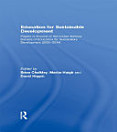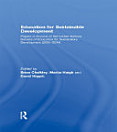Perspectives on Environmental Management and Technology in Asian River Basins
David Higgitt
2011 ഒക്ടോ · Springer Science & Business Media
ഇ-ബുക്ക്
122
പേജുകൾ
reportറേറ്റിംഗുകളും റിവ്യൂകളും പരിശോധിച്ചുറപ്പിച്ചതല്ല കൂടുതലറിയുക
ഈ ഇ-ബുക്കിനെക്കുറിച്ച്
Asian river basins are undergoing rapid transformation. This volume considers the implications of the environmental change-development nexus for water management, river health and hazard awareness. As Biswas and Tortajada (2011) have recently commented, water management in Asia will likely change more in the next twenty years than in the last 2000 years. Critical environmental trends include decreasing flows of water and sediment due to dam construction and increased water extraction, land use change (especially forest removal), encroachment and degradation of floodplain and wetland environments, increased water demand and concerns about water security, urban expansion and associated pollution of rivers and contamination of groundwater reserves. These challenges are being reframed by new approaches to water management which represent a transition from engineering-dominated approaches towards integrated water management, from technology transfer to adaptive technologies. The volume comprises an introduction and five chapters. Brierley and Callum reframe approaches to river repair within emerging theories of in ecology and earth science which regard nature as a complex adaptive system replete with inherent uncertainties. These ideas are mirrored in the four case study chapters which deal with water governance in the Mekong Basin (Hirsch); hybrid adoption of water resource technologies in India (Barbanente et al.); determination of sediment dynamics in Java Rijsdijk); and ecological conservation imperatives in the headwaters of the Yellow, Yangtze and Mekong rivers in western China (Li et al.).
രചയിതാവിനെ കുറിച്ച്
David Higgitt is Professor of Physical Geography at the National University of Singapore. He previously held posts at Durham University and Lancaster University in the UK. He is a geomorphologist whose research is focused on sediment delivery processes. He has worked extensively in Asia examining sediment dynamics and water chemistry in large rivers but also works on smaller scale catchment processes and management. David has served on the executive committees of the International Association of Geomorphologists and the Asia Oceania Geosciences Society. He has published numerous articles and book chapters on geomorphological and sustainability themes. He is also Editor of the Journal of Geography in Higher Education and Associate Editor of the Singapore Journal of Tropical Geography.
ഈ ഇ-ബുക്ക് റേറ്റ് ചെയ്യുക
നിങ്ങളുടെ അഭിപ്രായം ഞങ്ങളെ അറിയിക്കുക.
വായനാ വിവരങ്ങൾ
സ്മാർട്ട്ഫോണുകളും ടാബ്ലെറ്റുകളും
Android, iPad/iPhone എന്നിവയ്ക്കായി Google Play ബുക്സ് ആപ്പ് ഇൻസ്റ്റാൾ ചെയ്യുക. ഇത് നിങ്ങളുടെ അക്കൗണ്ടുമായി സ്വയമേവ സമന്വയിപ്പിക്കപ്പെടുകയും, എവിടെ ആയിരുന്നാലും ഓൺലൈനിൽ അല്ലെങ്കിൽ ഓഫ്ലൈനിൽ വായിക്കാൻ നിങ്ങളെ അനുവദിക്കുകയും ചെയ്യുന്നു.
ലാപ്ടോപ്പുകളും കമ്പ്യൂട്ടറുകളും
Google Play-യിൽ നിന്ന് വാങ്ങിയിട്ടുള്ള ഓഡിയോ ബുക്കുകൾ കമ്പ്യൂട്ടറിന്റെ വെബ് ബ്രൗസർ ഉപയോഗിച്ചുകൊണ്ട് വായിക്കാവുന്നതാണ്.
ഇ-റീഡറുകളും മറ്റ് ഉപകരണങ്ങളും
Kobo ഇ-റീഡറുകൾ പോലുള്ള ഇ-ഇങ്ക് ഉപകരണങ്ങളിൽ വായിക്കാൻ ഒരു ഫയൽ ഡൗൺലോഡ് ചെയ്ത് അത് നിങ്ങളുടെ ഉപകരണത്തിലേക്ക് കൈമാറേണ്ടതുണ്ട്. പിന്തുണയുള്ള ഇ-റീഡറുകളിലേക്ക് ഫയലുകൾ കൈമാറാൻ, സഹായ കേന്ദ്രത്തിലുള്ള വിശദമായ നിർദ്ദേശങ്ങൾ ഫോളോ ചെയ്യുക.





